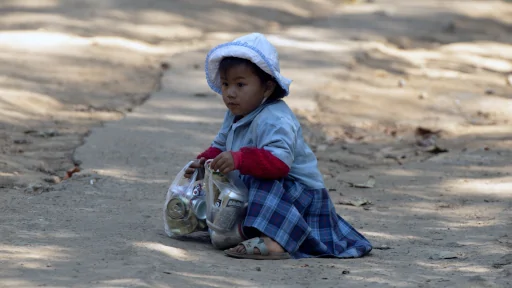Opinion Editorial Archive July, 2021: Rag-and-Bone Girl

When I was younger, my neighborhood was visited weekly by the rag-and-bone man. Arriving late in the day on a horse-pulled cart, he would collect almost anything that people were willing to discard if he saw any resale value in it. This was many years before anyone used the term 'recycling.'
The rag-and-bone man stopped visiting that neighborhood in the 1970s. Unless you've watched the British TV comedy show, Steptoe and Son, you probably have little concept of rag-and-bone men if you're aged below forty and you live in a developed country.
In the developing world, though, rag-and-bone men are still to be seen. Few of them use horse-pulled carts any longer, but their occupation is the same as my childhood rag-and-bone man.
The child in this month's photo is ethnic Shan. I photographed her early last year soon after I entered her small village in Burma (Myanmar). It may seem strange to use the term for a child of around six years old, but, on that day at least, she was a rag-and-bone girl. She was walking around her village collecting discarded cans to be recycled.
Tempting as it is to regard her as a young environmentalist, the reality is that her behavior, like that of the rag-and-bone men she resembles, is born of poverty. She is too young, of course, to be following science — or even to have any knowledge of science. Or is she?
As different peoples like the Shan migrated across the planet thousands of years ago, they also had no knowledge of science. Right?
Last month, a paper was published in the Proceedings of the National Academy of Sciences that challenges this common-sense view. Studying an Amazonian area of northeastern Peru, scientists found that the ancient peoples who lived there did not significantly disturb the natural habitat through overexploitation. While this finding offers no evidence that these peoples understood anything of science in the sense we use that term today, it does add to a growing body of evidence that indigenous peoples in general have a long heritage of understanding the importance of natural resource conservation.
That observation provides the basis for a comparison we can make with modern, non-indigenous people who have no knowledge of science, yet who claim to follow it anyway. We saw many examples of this last month. One comes from the semi-final tennis match between Nadal and Djokovic at the French Open. As it became clear that the match would extend beyond the Paris 11 pm curfew, the crowd made it equally clear that they would defy that curfew. The authorities succumbed to that crowd defiance as if the novel coronavirus were a tennis fan. (Then, two days ago, we learned that the British variant is no longer a tennis fan after 11 pm.)
My favorite example last month comes from the UK. Following science has become a mantra for its authorities. The reality is that they could not follow science even if it left a trail of breadcrumbs. Case in point: Matt Hancock. He announced a few days ago that fully-vaccinated people entering the UK from an 'amber' (at high risk from Covid-19) country would soon no longer have to isolate for ten days if they were British residents. As if the novel coronavirus could somehow tell who lives in what country. He showed a few days later, though, that he can follow public opinion: He resigned after having flouted his own Covid-19 restrictions.
In case we needed it, there was more evidence last month that parts of the world are becoming too hot for human habitation. Dozens died due to all-time heat records in Canada. As with Covid-19, only scientists seem able to follow science when it comes to the climate crisis. Rag-and-bone girl should, perhaps, be employed as a science teacher to some of the world's so-called leaders.
If you enjoyed reading this month's opinion editorial, please consider supporting independent, advertising-free journalism by buying us a coffee to help us cover the cost of hosting our web site. Please click on the link or scan the QR code. Thanks!

